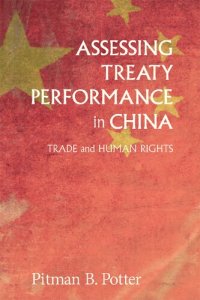
Ebook: Assessing Treaty Performance in China: Trade and Human Rights
Author: Pitman B. Potter
- Year: 2014
- Language: English
- pdf
Closer and more frequent contact among states and societies brought about by globalization has led to an increase in trade and human rights disputes that can challenge economic relations and cloud constructive relationships. Preventing these kinds of disputes where possible and managing them when necessary requires a better understanding of the cross-cultural dimensions of treaty performance on trade and human rights.
Assessing Treaty Performance in China examines the dynamics of Selective Adaptation and Institutional Capacity as foundations for China's legal performance around international standards on trade and human rights. The paradigm of Selective Adaptation reveals how local interpretation and implementation of international treaty standards are affected by normative perspectives derived from perception, complementarity, and legitimacy. The paradigm of Institute Capacity helps explain how operational dimensions of legal performance are affected by structural and relational dynamics of institutional purpose, location, orientation, and cohesion. These normative and operational perspectives are applied to China's legal performance on trade and human rights issues. For example, China's accession to the WTO is discussed as context for China's emerging legal regimes for contracts and property.
This volume outlines a new approach for understanding the treaty performance of an increasingly important actor in the international system. It also offers policy suggestions for more effective engagement with China on trade and human rights issues.
Assessing Treaty Performance in China examines the dynamics of Selective Adaptation and Institutional Capacity as foundations for China's legal performance around international standards on trade and human rights. The paradigm of Selective Adaptation reveals how local interpretation and implementation of international treaty standards are affected by normative perspectives derived from perception, complementarity, and legitimacy. The paradigm of Institute Capacity helps explain how operational dimensions of legal performance are affected by structural and relational dynamics of institutional purpose, location, orientation, and cohesion. These normative and operational perspectives are applied to China's legal performance on trade and human rights issues. For example, China's accession to the WTO is discussed as context for China's emerging legal regimes for contracts and property.
This volume outlines a new approach for understanding the treaty performance of an increasingly important actor in the international system. It also offers policy suggestions for more effective engagement with China on trade and human rights issues.
Download the book Assessing Treaty Performance in China: Trade and Human Rights for free or read online
Continue reading on any device:

Last viewed books
Related books
{related-news}
Comments (0)